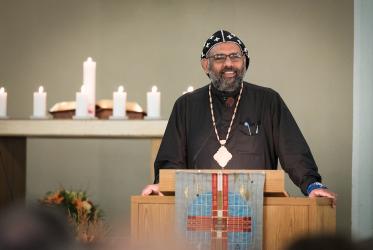Displaying 1 - 20 of 47
06 September 2022
Women with disabilities want to belong in churches
31 August 2022
Applications open anew for Bossey online course in ecumenism
13 January 2022
In a COVID-stricken world, “everyone is important”
23 October 2020
The cry of the Papuans in Indonesia
14 November 2019
WCC pays tribute to ecumenist pioneer
08 May 2019
A faith-based, holistic approach to HIV and AIDS-care
13 March 2019
Faith and HIV treatment go hand in hand
06 March 2019
Turning mercy and compassion into action
04 March 2019
On the journey to HIV – bridging gaps, debunking myths
21 February 2019
Metropolitan Zachariah Mar Nicholovos celebrates Silver Jubilee
26 November 2018
















